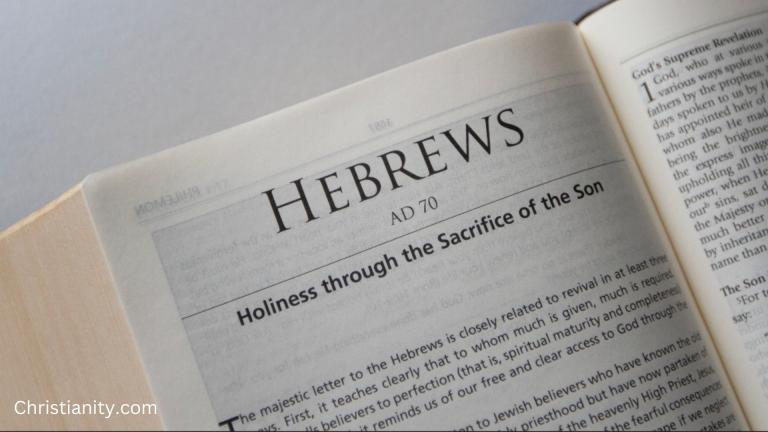Monday: Read Hebrews 6:9-20
In contrast to those who have fallen away (6:1-8), the author of Hebrews now turns to his audience and asserts that he is confident that they have indeed been faithful (9) and, consequently, is “convinced of better things concerning you” (9). After all, he continues, God is not unjust and He will not forget “your work and the love which you have shown toward His name” (10).
He then issues them a word of exhortation, “And we desire that each one of you show the same diligence so as to realize the full assurance of hope until the end” (11). This is followed by an exhortation to “not be sluggish” but be “imitators of those who . . . inherit the promises” (12).
The basis for our hope is in the promises of God (13). The author then appeals to God’s promise to Abraham that he would have a son (13-14), and eventually, he did (15). This hope is grounded in “two unchangeable things” (18): namely, God’s promise and His oath.
Since in human affairs, an oath provides confirmation that what has been said will be done, how much more so the case when the oath maker is God Himself? As a result, we have a hope that is “both sure and steadfast and one which enters within the veil” (19). The veil, of course, is to the inner sanctum of the temple where Jesus has entered (20).
Questions to ponder/discuss:
- It is evident that the author of Hebrews had a high view of works in relation to salvation. He is confident in one group because of their works and he urges another to be equally diligent. What are the pros and cons of emphasizing works with regard to one’s salvation? What are the pros and cons of denying the role of works with regard to one’s salvation?
- The appeal to God’s faithfulness in His promise to Abraham is important. Though some read this as a testimony that is solely in control of the promises, this might be taking the text too rigidly. The author of Hebrews’ point is that God was going to fulfill His promise. This does not mean, however, that Abraham had no role in the fulfillment. Abraham was to be patient.
- Hope does not seem to receive the attention that it should in the church. The author of Hebrews says that our hope is “an anchor of the soul” (19). Discuss the role of “hope” in the Christian life. How much would you say that your life is characterized by hope?
Tuesday: Read Hebrews 7:1-10
The author of Hebrews concluded the last section by noting that Jesus has entered the inner parts of God’s temple (6:20). But only the high priest was allowed in there. Knowing this, the author of Hebrews affirms Jesus’ qualification as high priest by contending that Jesus is a high priest but in the order of Melchizedek (6:20; see 5:6, 10). Now, the author begins to explain what he means by such a priesthood. In many ways, this teaching is the solid food that they should have already been taught!
Melchizedek is an obscure person who appears in one scene in Genesis (14:17-24). This actually serves the author’s purpose quite well. After all, in the Levitical priesthood, one’s genealogy was vital. One had to be a descendant of Levi in order to hold office. But no one knows Melchizedek’s genealogy (this is the meaning of “without father, without mother, without genealogy” (3). It is in this sense that he was “like the Son of God” (3). His point is that one’s genealogy is not a requirement in the order of Melchizedek. Instead, it is the greatness of one’s character that is required.
As an affirmation of the greatness of Melchizedek, the author of Hebrews notes that Abraham paid him a tithe (4). This act contrasts the Levitical priests who collect a tithe because the law requires it (5). Melchizedek, however, received a tithe because he was greater than Abraham: and, thus, Melchizedek, “blessed the one who had the promises [Abraham]” (6). This means that Melchizedek is clearly greater than Abraham (8).
Questions to ponder/discuss:
- The significance of Jesus’ priesthood cannot be overstated. At this point, we must recognize that we too have inherited a priesthood. Of course, Jesus as the true high priest was the sacrifice that brings salvation to all. This, however, does not mean that we are not to offer ourselves as sacrifices just as he did. Sure, our sacrifice does not provide atonement or bring the forgiveness of sins. But our sacrificial love for others is meant to imitate Jesus and, thereby, make Him known! Thus, Paul says, “present your bodies a living and holy sacrifice, acceptable to God, which is your spiritual service of worship” (12:1). This means that as important as it is to recognize what Jesus has done for us, we must not forget that we too are called to sacrificial living! Make it your prayer for the next 10 days that God would show you what it means for you to live a sacrificial life for the sake of others and that He would empower you through the Holy Spirit and humility to do so.
Wednesday: Read Hebrews 7:11-22; Psalm 110:1-7
The author of Hebrews expands on the distinction between the OT Levitical priesthood and Jesus as the high priesthood by comparing them to the order
He begins by noting that perfection was not possible in the Levitical priesthood (11). Hence it was necessary for another priesthood to come.
That Jesus is a high priest from another order is obvious from the fact that he is not from the tribe of Levi but the tribe of Judah (14). Therefore, Jesus did not become a high priest on the basis of some physical requirements (16). Instead, he is one because he lives: i.e., “according to the power of an indestructible life” (16).
This is affirmed in Psalm 110. This Psalm is the most cited OT passage in the entire NT. Psalm 110:4 affirms that He is a “a priest forever according to the order of Melchizedek” (17, 21).
Jesus’ receiving of the Melchizedekian priesthood means that the Levitical priesthood is now set aside (18). This does not mean that the Levitical priesthood was worthless. It was simply temporary until “the guarantee of a better covenant” had come (22).
Questions to ponder/discuss:
- As we noted in yesterday’s discussion, we too have obtained a priesthood from God. And it is not on the basis of some physical requirement but on the basis of God’s love for us by which we have been called. Discuss the significance of this for the people of God and how this might encourage us to “present our bodies a living and holy sacrifice” (Rom 12:1).
Thursday: Read Hebrews 7:23-28
Today’s reading continues the author’s discussion of Jesus as the great high priest according to the order of Melchizedek and its significance by noting the contrast between Jesus as the high priest and the Levitical priesthood.
First, the author contrasts the Levitical priests by noting that there were many of them because they died and needed to be replaced (23). Jesus, of course, lives forever, and consequently “holds His priesthood permanently” (24). The author concludes from this that, “Therefore He is able also to save forever those who draw near to God through Him, since He always lives to make intercession for them” (25).
Jesus also meets our needs because “holy, innocent, undefiled, separated from sinners and exalted above the heavens” (26).
Furthermore, in contrast with the Levitical priests, Jesus does not need to offer sacrifices first for His own sins like they do (27). In addition, Jesus offered “Himself” (27). That Jesus is both a holy priest and the sacrifice also distinguishes Jesus from the Levitical priests. They certainly did not offer up themselves.
Finally, he notes that the Levitical priesthood appoints priests who by nature are weak (28).
Questions to ponder/discuss:
- It is important to note that the author of Hebrews does not mean to denigrate the Levitical priesthood and its priests as though they are something bad. The comparison is between the Levitical priesthood prescribed by the Law and Jesus’ Melchizedekian priest given by an oath and based not on Jesus’ family line but on His character (holy) and His eternal nature.
- Spend some time today in meditation on this passage and what Christ has done on the cross.
Friday: Read Hebrews 8:1-13
In Hebrews 8:1-13 the author continues his comparison of Jesus and the Levitical priests by noting that Jesus has ministered in the true heavenly tabernacle (2). This tabernacle was built by God and not man (2).
He beings by noting that Jesus is the high priest that he has just described in 7:1-28. And that when He finished His work He sat down at “the right hand of the throne of the Majesty in the heavens” (1). The significance of this cannot escape here. The fact that there is no provision for a Levitical priest to ever sit down. This is because their job is never finished. As the author will note in 10:11, “Every priest stands daily ministering and offering time after time the same sacrifices, which can never take away sins.” Since their sacrifices cannot take away sins, they must continually offer them until the One should come whose sacrifice for sins does take away sins.
In addition, Jesus’ priesthood is superior because the heavenly temple in which He serves is the true temple. In fact, the one which the Levitical priests serve is in merely “a copy and shadow of the heavenly things” (5).
All of this means that Jesus is the high priest of a better covenant that has been enacted on better promises (6). The author then goes on to cite Jer 31:31-34. The passage in Jeremiah is of course one of the central promises of the “new covenant” (8; see Jer 31:31).
Questions to ponder/discuss:
- The new covenant brought about by Jesus was inaugurated at the Last Supper (See Matt 26:17–29; Mark 14:12–25; Luke 22:7–38; and I Cor 11:23–25). When we take communion we are acknowledging three things.
- First that Christ has inaugurated the new covenant in His death and resurrection
- Second, we too are to be willing to lay down our lives for one another just as Christ did for us (NB: this is why Matt 5:23-24 says that if we have a brother that has something against us we are to leave our offerings at the altar and first be reconciled. Thus, in taking communion we are acknowledging that we too will love others as Christ has loved us.
- Third, communion reminds us of the hope that is before us as we await the eternal banquet in which all eat freely and no one is excluded
[1] This guide is meant to be done either as a group study over the course of 2 or 4 meetings (Day 1-5; 6-10; 11-15; 16-20), or as a private devotion over the course of 4 weeks (or a calendar month—5 lessons per week).
















